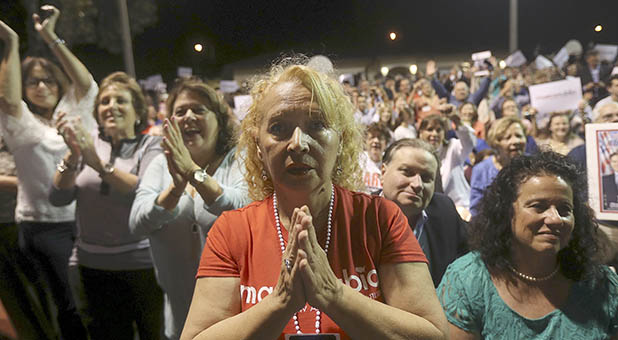Will the 2016 Election Make Christians Stop Using This Label?
Who is an evangelical? It’s a question that has been prompted more by the current state of the 2016 presidential election than any other issue to date.
Part of that could be a lack of a common definition for the term. That’s evidenced by the studies that show a widely divergent number of evangelicals living in the U.S. One study says there are roughly 62 million, while another puts the number closer to 100 million.
Wheaton College attempted to describe the confusion:
“Given the imprecision involved in defining exactly what—or who—an evangelical is, it is no surprise that it is extremely difficult to establish a precise estimate of their exact numbers in the United States. With so many different evangelical denominations, thousands upon thousands of independent evangelical churches, evangelical constituencies of varying sizes within historically evangelical ‘mainline’ Protestant denominations—and even inside non-evangelical denominations—there is no single entity that can possibly serve as a representative gatekeeper (or census-taker) for the movement.”
Gallup, which produced the 100 million estimate, is similarly perplexed by the “who is an evangelical?” question:
“The term “evangelical” itself is vague, and has been defined and operationalized in a number of different ways in the past.
“About 8 in 10 Americans at least nominally adhere to a Christian faith of one sort or another. The term evangelicals refers to a subset of this enormous group — a segment of Christians who by various definitions take their religion very seriously and also believe that the religious calling means that one should take action within the environment in which one lives. The most obvious such aspect of the environment is politics, and thus there has been an explosion of interest in the effect of the evangelical wing of the Republican Party on the political realm in recent years.
“But, there is a great deal of confusion about exactly who evangelical Christians are. At various times, people have assumed that evangelicals are individuals who are adherents to certain denominations within the Christian faith, or that evangelicals are those who take their religion very seriously, adhere to more conservative or fundamental religious doctrine, have had specific religious experiences, or have specific beliefs about the correct relationship between religion and society.
“Obviously, the aforementioned criteria produce quite different estimates of the percentage of the American population that is “evangelical.” Some organizations have used a very strict criterion requiring respondents in surveys to answer affirmatively to a number of doctrinal and other questions before being considered to be evangelicals. Gallup has at times used a procedure consisting of three questions asking respondents if they have had a born-again experience committing themselves to Jesus Christ, if they have tried to encourage someone to believe in Jesus Christ, and if they believe the Bible is the actual word of God. Twenty-two percent of Americans agree with all three questions, according to a Gallup Poll conducted in May 2005.”
Gallup uses a rather vague self-labeling definition, asking respondents, “Would you describe yourself as a ‘born again’ or evangelical?” This same question is used by other organizations, particularly the Associated Press, which conducts most of the exit polling during the presidential election process.
These same exit polls, in turn, are used to create a narrative that “evangelicals” are voting a particular candidate or policy. But when neither the questioner nor the respondent understand what is being asked, is the resulting data even relevant to any discussion?
The word “evangelical” is derived from the Greek word euangelion, which means “gospel” or “good news.” In other words, an evangelical is one who believes in the Good News—that Jesus Christ died on the cross to pay for our sins so that we might be saved from eternal damnation through our faith in Him and His saving grace alone—while an evangelist is one who shares the Good News with others.
Russell Moore, president of the Ethics & Religious Liberty Commission of the Southern Baptist Convention, has sought to separate his faith from the pollsters’ survey questions. But he’s nowhere near ready to abandon the term “evangelical,” when it’s applied correctly.
“It’s a beautiful word that we can and ought to reclaim,” he has said. But, it’s going to be a difficult job to reclaim the term. Evangelicalism has done a very poor job of “maintaining its theological identity,” he said.
“I think that’s changing because when one looks at what’s happening in the universities, in the seminaries, in the major conferences across the country, there’s an evangelicalism that is much more subconsciously, theologically aligned,” he added. “It has been necessitated by shifts in evangelical culture.”
Some of that shift has been purposeful. Groups like the Reformation Project, which is active on many Christian college campuses across the U.S., have a mission of “train Christians to support and affirm lesbian, gay, bisexual, and transgender people.”
With so many mainline Protestant denominations falling prey to those efforts, maintaining the theological identity of evangelicalism will have to be just as purposeful. Moore said he ascribes to the Bebbington Quadrilateral, named for David Bebbington, a professor of history at the University of Stirling in Scotland, which defines evangelicalism.
It states that evangelicals share these four characteristics:
- conversionism—a belief each person must experience a conversion and be born again;
- activism—a need to express one’s belief in the gospel through action;
- biblicism—a high regard for the Bible as the ultimate authority; and
- crucicentrism—an emphasis on Christ’s sacrifice on the cross.
“Evangelicalism is not some abstract ideology,” Moore has said. “It’s a commitment to the gospel that people who have submitted themselves to the lordship of Jesus Christ have made, including in their church lives.”
Meanwhile, there’s room for diversity under a “big tent” on secondary issues, such as a “believer’s baptism,” the nature of spiritual gifts, and the role of women in the church. In those areas, there is room for negotiation and disagreement within the umbrella of evangelicalism.
















































